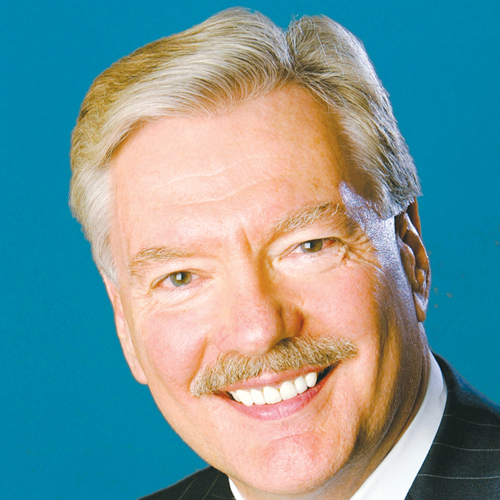When Ray Blanchette joined Joe’s Crab Shack as chief executive in May 2007, the brand had been cut loose a year earlier from Landry’s Restaurants Inc. and was shedding underperforming stores. In the months and years that followed, Blanchette and his team rolled out several rebranding initiatives that successfully gained traction — emphasizing crab on the menu, upgrading service and fine-tuning marketing. Starting with the fourth quarter of 2008, Joe’s Crab Shack began a run of 18 consecutive quarters of same-store sales growth. At the end of 2012, it boasted 129 units tallying more than $413 million in U.S. systemwide sales.
Joe’s Crab Shack is owned by Ignite Restaurant Group, which went public in May 2012 and also operates the Brick House Tavern + Tap and Romano’s Macaroni Grill brands. Blanchette spoke with his former colleague at T.G.I. Friday’s, Wallace B. Doolin, who won a Golden Chain Award in 1998 as CEO of that casual-dining chain. Doolin is currently the chairman of Thomas Doolin and Associates LLC. An excerpt from their conversation follows:
Wally Doolin: In your organization, when you look at somebody that is fairly new and promising, what would you tell that person about why they should continue to grow and develop in this industry?
2013 GOLDEN CHAIN
• A timeline of career and company highlights for Ray Blanchette
• More interviews and timelines on this year's winners
Ray Blanchette: It seems like every couple of years, as I was learning and growing and taking on new responsibilities, every time my growth line started to flatten out, there was some new challenge or some new opportunity out there to put me right back into a growth mode. I think that’s probably the piece, when I look back over a 25-year-plus career, that is the most interesting. The fact that I’ve opened restaurants in 25 countries around the world, or was able to go from being a kitchen manger to a general manager and a general manager to a director — it was fascinating, interesting. The fact that our industry discriminates only on performance and you get a regular report card, I think, makes it a great place for someone to hang their hat.
WD: Some people aren’t comfortable with that kind of change, but you were. When advising people, do you advise them to take on new challenges?
RB: We’re fanatical about it here. We have a lot of very, very talented young people that work here, and that is my constant challenge to them. Find interesting learning chasms to cross, and cross them. Take on these new opportunities and challenges. If you’re in marketing, get into operations. Do different things; broaden your perspective. That’s the surest way to get the most out of someone’s career.
WD: Let’s talk about Joe’s and your terrific success. Talk to us about how you orchestrated this kind of turnaround.
RB: The reason I wanted to come to Joe’s in the first place is I thought it was a good idea. You have a house in Maryland, Wally, and you know I’m from Maryland, and I thought the idea of a national crab house was a good idea. It wasn’t until I came to Joe’s that I realized we actually didn’t sell a whole lot of crab. Even though it was our middle name, it was only about 17 percent of revenue. Today, it’s about 50 percent. … We made a very conscious decision to be best in the world at something. We narrowed our focus, which, in a lot of cases, will fly in the face of what consultants will tell you to do. Everybody says to deal with the veto vote and cast a wider net, and we did the exact opposite. We’re going to be a national crab house, be the best in the world, create innovative new dishes and flavors. … Having a meaningful and distinctive point of differentiation was probably the primary driver of the change [at Joe’s], getting us to go from $2.1 million [in annual unit volume] to the $3.3 million we’re at today.
WD: What are the different challenges you face now, as opposed to when you started the turnaround?
RB: The problems we face today are more of those first-world problems. We’re out in what has been a tough macro environment trying to grow sales and guests off a base of five years of growth. That’s the biggest challenge. The good news is we’ve continued to work in this brand for more than six years, and the way we understand the brand is at a much higher level. … We’re very comfortable in our own skin, and we’re finding new ways to go out and drive engagement with our guests. …
With the new positioning, what we tried to solve for is: What is the fundamental truth about the business? Telling the truth is so much easier than trying to make something up. When we got to this whole idea that we’re a Southern seafood restaurant with Gulf Coast heritage and it is a fundamental truth, … when you start pulling that thread, you get really excited about the potential — how “ownable” and defendable that is. That’s what gets me juiced today for the next five years of growth for Joe’s. …
It was all about what we can get people digging out of the shell themselves. I don’t care if it’s a mussel, a clam, a crab leg or a lobster, there is something kind of carnal and interesting and unique about sitting down at a table, putting the paper out in front of you, rolling up your sleeves, getting a great big draft beer and just going to work. That is a completely unique experience you’re simply not going to get anywhere else. We wanted to own that space.
WD: When you hang it up a little bit and reflect on your career, what are the things you want to be able to say you’re most proud of?
RB: It stems from people. When I look at all of the talented folks that work here at Ignite, being able to help them get more out of their careers than they think they are capable of getting is probably the most important legacy. From a brand perspective, having brands we’re proud of and doing work we’re proud of. I think back to when I first got here, … we were in a full-on turnaround. … We circled the wagons and pulled all the support people together and said, “Look, we’re not going to do layoffs; your jobs are important to us. You’re going to have to wear more than one hat, but we’re going to get through this, and we’re going to come out the backside a strong company.” … When you walk away and see those jobs are intact and people had robust careers and are taking care of their families, to me, that’s the piece of this job that is the most meaningful.

Wallace B. Doolin received a Golden Chain Award in 1998, when he was chief executive of the T.G.I. Friday’s chain. Doolin currently serves as chairman of Thomas Doolin and Associates LLC, parent company to People Report and Black Box Intelligence.





